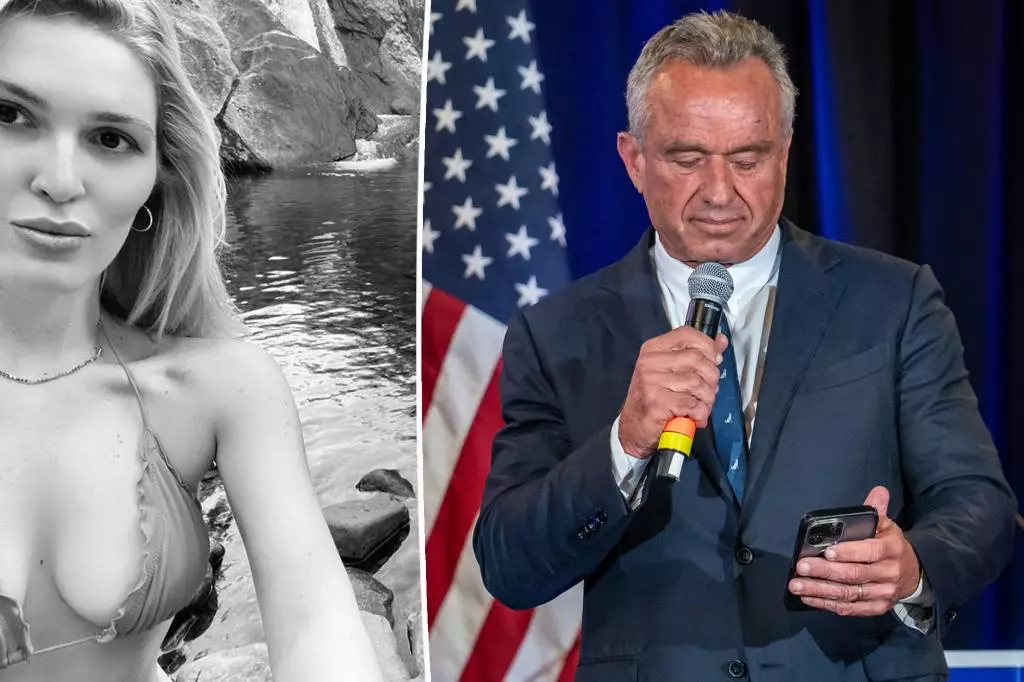The recent revelations regarding the romantic entanglement between Robert F. Kennedy Jr., the prominent political figure and grandson of the late Robert F. Kennedy, and Olivia Nuzzi, an accomplished journalist with New York Magazine, have drawn considerable media attention. What was initially reported as a mere flirtation has unfolded into a complex saga filled with emotions, deception, and personal risk. This article delves into the intricacies of their relationship, revealing how a seemingly innocent professional interaction morphed into an extraordinary and unforeseen romantic affair.
In October, a professional interview brought Nuzzi and Kennedy together for the first time. However, Nuzzi was reportedly taken aback by Kennedy’s awkward advance, leading her to feel disgusted at the onset. It was a classic case of mixed messages—the initial clumsiness of a man used to being in the public eye collided with Nuzzi’s professionalism, creating a palpable tension. Yet, as their conversation extended beyond that initial meeting, what began as mutual disdain transitioned into a profound emotional connection, thanks in large part to incessant communication through text and FaceTime.
Love Bombing and Infatuation
Sources indicate that Kennedy initiated a strategy of “love bombing,” overwhelming Nuzzi with affection and attention that ultimately led her to become infatuated with him. Love bombing is an emotional manipulation technique aimed at making another person feel special and valued initially, only to later manipulate or control them. Nuzzi, who had been engaged to her partner for nearly a decade, found herself living a dual life—maintaining her existing relationship while simultaneously entangled in a virtual relationship filled with intimacy and emotional depth with Kennedy. This phenomenon raises questions about the boundaries between personal and professional spheres, especially in a world increasingly reliant on technology for relationships.
Strange Dynamics and Power Plays
The dynamic of their clandestine relationship seemed governed by control and secrecy. Insiders reveal that Kennedy often dictated the terms of their interaction, creating an environment of unpredictability that left Nuzzi anxious for his attention. This power play is common in affairs where one party holds significantly more public influence. Their exchanges included moments of vulnerability, yet Kennedy’s controlling tendencies turned the relationship into a rollercoaster ride of emotions, where periods of intense connection would be followed by abrupt silences, leaving Nuzzi longing for what they shared.
Highlighting the poignancy of this affair is the emotional complexity portrayed by both individuals. According to reports, Nuzzi confided in her close friends about her feelings for Kennedy, referring to him as an enchanting figure without revealing his identity initially. Her emotional investment was so profound that friends observed changes in her character over time—indicative of the psychological toll such insidious relationships can exact. Meanwhile, Kennedy, observed by some as a notorious charm offensive, seemed to leverage his storied family lineage and the legacy of his father and uncle to ensnare Nuzzi, complicating her perception of reality and responsibility.
The jeopardy of both Nuzzi’s personal and professional life became evident when her partner, Politico journalist Ryan Lizza, sensed something amiss. By August, he confronted Kennedy directly, underscoring the precarious situation at hand. Nuzzi’s contacts with Kennedy led to scrutiny from her employer, resulting in a suspension that prompted an internal investigation. Although the magazine asserted that it found no evidence of bias in her work, the mere fact of an investigation into her integrity prompted reflections on the ethics of media professions in the context of personal relationships.
Concluding Thoughts
The intelligence and ambition that characterize Nuzzi’s career, juxtaposed against the extraordinary pull of Kennedy’s family legacy, provide a fascinating study of how personal and professional dynamics can intertwine dangerously. As Nuzzi faces the fallout of her choices, ranging from public scrutiny to potential career repercussions, the narrative unfurls like a cautionary tale. The controversy calls into question not only the ethical boundaries within journalism but also the vulnerabilities individuals face when caught in a web of emotional complexity and political power. Ultimately, this saga underscores the sometimes perilous intersection of love, ambition, and consequence in the public eye.

